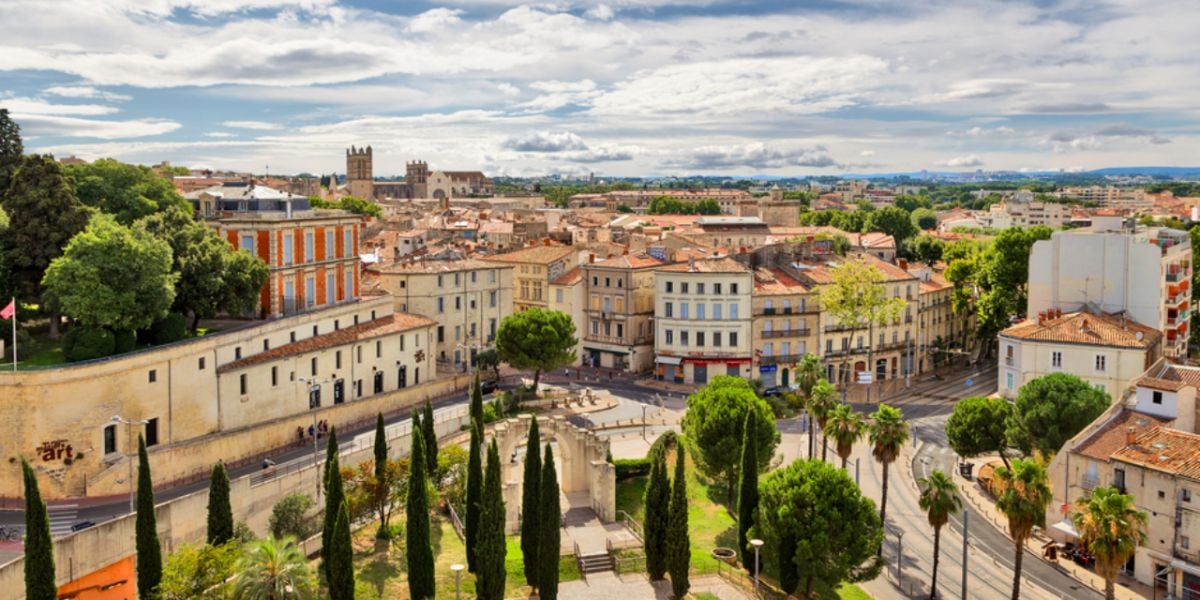
Montpellier attracts many students thanks to its many assets, including its cathedral, medieval streets, pedestrianized historic center, 13th-century universities, Mediterranean climate, mild temperatures, and sandy beaches just 10 km away. The city is particularly dynamic, with a population of 305,743, including 70,000 students.
Thousands of international students venture across borders to pursue their studies in distant lands every year. Montpellier, nestled as a Mediterranean gem in southern France, is increasingly becoming a preferred destination. Why choose Montpellier? Beyond its rich historical legacy and laid-back lifestyle, Montpellier boasts an exceptional academic and cultural environment, proudly preserving its eight-century-old academic heritage. Its university, one of the oldest in the Western world, nurtured the minds of luminaries such as Rabelais and Nostradamus. Today, it continues to shine through its distinguished institutions, offering a wide array of disciplines from sciences to arts, law, and medicine — a fertile ground for aspiring minds hungry for knowledge.
Montpellier is a cosmopolitan city that hosts a diverse mix of students from around the world. This cultural diversity inspires limitless creativity, promotes intercultural exchanges, and broadens horizons. The connections formed within this international community often leave lasting impressions.
The sun, a constant companion, forms a bond between Montpellier's residents and visitors. The Mediterranean climate provides mild winters and sunny summers, perfect for leisurely walks along medieval streets or lounging on the nearby sandy beaches. It offers a refreshing escape from the busy student life.
Montpellier's students are never left out. Cultural, artistic, and sporting events abound. Lively cafés, vibrant concert halls, and picturesque markets are great places to exchange ideas and discover new things. Socializing with friends, whatever their origin, is a way of life here.
Montpellier isn't just a hub of education; it's also a fertile ground for professional growth. The city's vibrant economy and innovative companies provide enriching internships and promising career opportunities. The experience gained here is a valuable asset in the global job market.
Don't hesitate to continue your research by posting your questions on the Montpellier forum and by reading the Guide de l'expatrié en France.
Public universities in France
French universities operate on the European Credit Transfer System (ECTS).
There are two ways to continue your studies in the French higher education system:
- through the expensive but highly reputed "grandes écoles". To be admitted to these schools, you must pass a competitive entrance examination after two years of preparatory classes;
- by joining a public university that offers a wide range of courses and degrees. These institutions provide excellent research opportunities, and, above all, registration fees differ depending on whether you are a European or non-European student and the degree you are studying for.
Montpellier's main academic institutions
University of Montpellier
Founded in 1220, the University of Montpellier (UM) is one of the oldest universities in the world, combining history and modernity. The Faculty of Medicine is still housed in the former episcopal palace and is listed as a historical monument. The former convent houses the College of Law, but the UM has expanded over time to form a network of campuses in the heart of the city.
Ranked 511th in the QS World University Rankings 2023 and between 151st and 200th in the Shanghai Ranking 2023, UM provides a diverse array of programs across its 8 faculties, encompassing disciplines such as law, political science, economics, agriculture, and health. It is renowned for its offerings in earth and ocean sciences, as well as its focus on research and technological sciences, including medicine, pharmacy, dentistry, and biology. A significant number of researchers are actively engaged in UM's research centers, particularly in areas like algorithms, robotics, and ecology.
The UM also includes seven institutes and two schools. The campus network extends beyond the city, with links to Béziers, Nîmes, Perpignan, Sète, Mende, Narbonne, and Carcassonne.
The UM offers support and assistance to students with a business project, offering the possibility of replacing the compulsory internship in a company with "free" hours devoted to developing and advancing their projects.
The university participates in Erasmus exchanges all over the world, but it should be noted that it has a special partnership with Quebec via the BCI. As a foreign student, there are several possibilities open to you if you wish to study at UM, including through an inter-university partnership.
Université Paul Valéry-Montpellier 3 (UPVM)
Founded in the 13th century, Paul Valéry University spans five different locations — four in Montpellier and one in Béziers — depending on the chosen course of study. The main campus houses the university's administrative headquarters and features a twentieth-century historical heritage site. Additionally, amenities include a library, theater, museum, and La Maison des étudiants, the vibrant center of UPVM.
The university excels in arts, literature, languages, law, economics, management, humanities, and social sciences. In the 2024 QS international ranking of higher education institutions, Université Paul-Valéry Montpellier 3 maintains its position among the top 1,200 universities globally and ranks first among French universities in LLASHS (Letters, Languages, Arts, Humanities, and Social Sciences).
It also boasts a leading position in distance learning, as the French university offers the largest number of AED (distance learning) degrees.
UPVM is open to the international scene, with the now-famous Erasmus program and programs in English. It also maintains close ties with Quebec, the Middle East, and many other institutions around the world.
UPMV offers Bachelor's, Master's, and PhD degrees. For some courses, foreign students must pass English or French proficiency tests.
Administrative formalities for foreign students in Montpellier
No visa is required for students who are citizens or residents of a European Union or EFTA (European Free Trade Association) country.
Students from non-EU countries must apply for and obtain a visa to study in France.
Further information on visas and residence permits for France can be found here. If the stay exceeds 6 months, a residence permit will also be required.
Financing your studies in France
As a foreign student, there are several ways to finance your studies in France:
- by obtaining a grant from your home university;
- by receiving a "subsidy" from the French university concerned or from specific organizations.
For a full list of funding options, check the "Finance your studies" section of the France Diplomatie website.
Foreign students are also entitled to work in France, provided they are covered by social security and have a residence permit if they are not from the European Union.
Working in France as a foreign student
If you'd like to do an internship in France during your studies, you should be aware that the same regulations apply to foreign students (whether or not they are citizens of the European Union) as to French students. If you are not a citizen of the European Union (EU), your student visa will allow you to carry out an internship, but only under certain conditions.
EU students can stay and work in France without restriction after graduation. Certain conditions apply to foreign students, such as the level of study and salary received.
To find a job in Montpellier, you can consult the vacancies available on Expat.com or interact with the city's expatriate network. Alternatively, there are other channels for finding a student job, such as websites dedicated to students like Erasmusu, Student Job, or l'Étudiant. You can also search for jobs on more general job search sites such as Indeed, Glassdoor, or LinkedIn. Don't forget France Travail, the French national employment agency, which regularly publishes job offers for students. In fact, if you are a national of an EU member state or if you have the appropriate residence permit, you can register as a student looking for a job.
Student accommodation in Montpellier
Montpellier CROUS offers a range of accommodation solutions in student residences. For example, the Cité Universitaire du Boutonnet offers rents ranging from 250 euros (room) to 400 euros (studio). Alternative solutions include homestay, one-off, or annual accommodation.
Montpellier CROUS also provides support services and operates a sponsorship program where a university student hosts and assists another foreign student.
For classic apartment or studio rentals in Montpellier, you can consult the following websites: Immo Jeunes, Le Bon Coin, Studapart, Fac Habitat, Location Étudiant, and Loc Services.
If you're interested in sharing, you'll find that many students opt for this alternative. We recommend the websites Adèle, La Carte des Colocs, Whoomies, and Appartager for your search for a flat-share.
Staying with a host family is also an idea worth considering, not only because it can help you make rapid progress in learning French but also because of the economic and convivial nature of this type of accommodation.
Cost of living in Montpellier
For meals, count on the university restaurants and cafeterias (3.20 euros/meal for non-scholarship holders, 1 euro for scholarship holders).
Regarding public transport, since December 21, 2023, all residents of the Montpellier metropolitan area have been able to travel for free on the entire network (Réseau Transports de Montpellier – TaM). To obtain the free pass, simply visit a TaM branch with identification, a passport photo, and proof of address. Alternatively, the process can be completed online.
No-commitment subscriptions are still available for people who do not live in Montpellier:
- annual pass at 196 euros for under-26s (+ access to Véloparcs);
- annual pass at 360 euros for over-60s (+ access to Véloparcs).
Details of all subscriptions and unit rates are available on the TaM-voyages.com website.
Montpellier excels at catering to its student population with a variety of cultural activities. Through the CROUS, students can join YOOT, a program offering access to a wide range of activities at discounted rates for just 9 euros per year — an incredible deal!
The average student needs a budget of approximately 700 euros a month. Budgeting is necessary, as well as including some leisure activities and compulsory health insurance. Foreign nationals under 28 years of age who study for more than 4 months in France can contribute annually to the French social security system.
Where to live as a student in Montpellier
For convenience, we recommend finding accommodation near your university, school, or hospital where you study, ensuring easy access to academic facilities.
Montpellier's Central Station district is perfect for party-goers, as many of the night owls' hangouts are in this area.
The École des Beaux-Arts area is a pleasant neighborhood for its lively, bohemian feel.
Leisure and student life in Montpellier
There is a wealth of activities to explore in Montpellier: take a stroll through the historic pedestrian center (l'Écusson), unwind in the botanical gardens for a touch of exoticism, visit the city's numerous historic buildings and museums like the Musée Fabre and the Musée du Vieux Montpellier... You can also immerse yourself in the various festivals and concerts at the renowned Rockstore. Montpellier boasts a vibrant cultural scene!
If you enjoy shopping, the Odysseum shopping center is a must-visit. It features a variety of stores selling clothing, home furnishings, and electronics, along with restaurants and a large supermarket. On weekends, many students come here not just to shop but also to enjoy activities such as skating, visiting the planetarium and aquarium, and playing laser games.
In the vicinity of Montpellier, you can explore cathedrals, caves, and sandy beaches easily accessible by tram. Montpellier is especially delightful and sunny in spring and summer, making its beaches particularly popular. Notable spots include Petit Travers and Grand Travers between La Grande Motte and Carnon, Palavas les Flots, Les Aresquiers in Frontignan, and L'Espiguette. For cave enthusiasts, a must-see is the Clamouse Cave, recognized by the French Ministry of Ecology for its abundance of aragonite crystals.
In and around Montpellier, you'll also find several green spaces where nature lovers can take a stroll. In the north of the city, visit the Bois de Montmaur, the Lunaret Zoo and Reserve, the Parc Agropolis, and the Domaine d'Ô.
As mentioned above, those who love nightlife can head to the Gare district, which is the center of the city's student nightlife. If you like tapas bars, head for Saint-Roch. This charming district, with its labyrinthine streets, is home to some bars where many young people meet in the evening. In Port Marianne, east of Montpellier, you'll find trendy spots and a wide choice of cocktail bars.
Useful links:
France Travail – Foreign workers
We do our best to provide accurate and up to date information. However, if you have noticed any inaccuracies in this article, please let us know in the comments section below.








